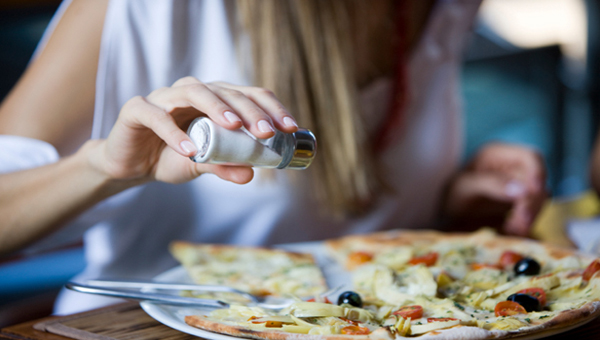Salt has been used for thousands of years to season food in order to make it more palatable. In present times it has become more than just a seasoning. It has played a role as a risk factor for heart attacks, strokes, high blood pressure, and more. The silent epidemic of salt consumption is indirectly responsible for thousands of deaths and it needs to be brought to peoples’ attention.
According to the Food and Drug Administration, about 90% of the U.S. consumes way to much salt. Most of that comes from eating processed fast foods. There is lots of salt in restaurant food because it increases the taste. Most restaurants are not concerned with your health. Their main concern is running a business that attracts people with tasty food.

The DRI for salt recommends that you intake no more than 2,300 milligrams per day. That is about a teaspoon worth of salt. For “at risk” people the recommended daily intake drops to 1,500 milligrams per day. The “at risk” population includes persons over 51 years old, Afro-American, or anyone with hypertension (high blood pressure) or diabetes.
On average, Americans consume over 3,400 milligrams of salt daily. Harvard’s School of Public Health says that 1 in every 10 deaths is somehow related to over-consumption. The medical school at Harvard stated that if consumption was decreased, over a 10 year period approximately half a million lives could be saved.
Table salt is not the only culprit in this epidemic. Sodium is already present in many foods like bread, cereal, and legumes. The salt that we add to our food is just the icing on the cake.
Northwestern University did a study tracking the amount of sodium in fast food meals. Many places like Mcdonalds, KFC, Panera Bread, Olive Garden, and more, had enough sodium in one meal to fill your requirement for the whole day. Many companies have started campaigns to reduce salt content, but in reality foods have increased sodium levels by an average of 2.6 percent.
The reason that sodium effects our health so negatively is that it causes you to retain water. Blood vessels will fill with extra water increasing the blood pressure against the vessel walls. This forces the heart to work extra hard. It can even make you feel bloated.
In order to decrease the amount of sodium in your diet the first thing you must do is be aware of what you are eating. It has to be a priority to eat fresh food instead of fast, processed food. Here are some ways that you can decrease the amount of sodium that you are consuming.
- Look for low sodium, or salt free seasonings and flavors. A good substitute is to sprinkle your food with lemon juice instead of table salt.
- If at all possible, stick to fresh vegetables instead of canned vegetables. The juice in the canned vegetables is extremely high in sodium. If you do eat canned foods, drain the fluid and rinse the veggies before eating.
- Always read the nutritional information of foods. Even when you eat at restaurants there are always ways to get the information. It’s either online, or simply ask. Some good key words to look for are “reduced sodium”, “no added salt”, “sodium free”, etc.
- Eat foods that are high in potassium to slightly reduce the negative effects of sodium. This includes bananas, spinach, yogurt, potatoes, beans, etc.
The silent epidemic of salt consumption needs to be brought to the attention of the public. Spread the word on Facebook and Twitter. If you have any other questions about the effects of salt, please contact me. Reduce your risk of chronic disease due to sodium intake. If we as a population are more aware of this then we can decrease these terrible statistics.
 About Adam Pegg
About Adam Pegg



